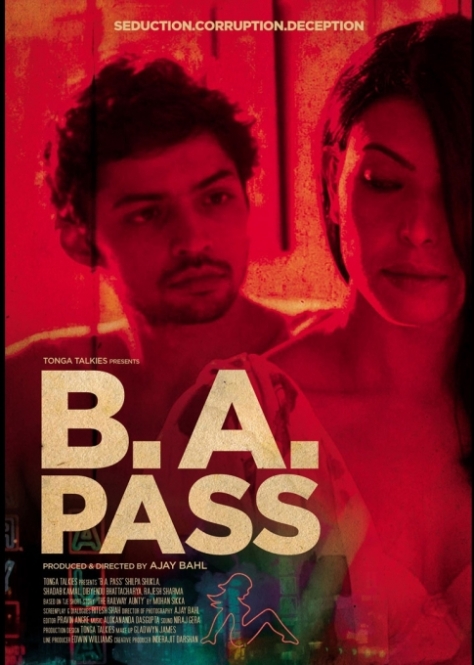When I read ‘The Railway Aunt’ by Mohan Sikka (Which features in ‘Delhi Noir’ – A compilation of short stories throwing light on India’s capital and dark underbelly) I knew there was a potential script hidden in it to be adapted on celluloid. But my mere thoughts were executed and channelized into action by Director Ajay Bahl to make ‘B.A. Pass’ and How!
I have mentioned this many a times earlier and I stand by the fact that I am not a film reviewer, I am just a viewer putting forth my views without the objective of influencing one’s viewing habits. I respect all the film critics writing for the publications and on broadcast media, however with all the reviews coming in for B.A. Pass what is definitely irking me is the fact that all critics are labelling the film under the genre of ‘Drama’. Clarifying this major blunder, I would like to state that B.A. Pass is a pure, out and out ‘Neo-noir film’. Throwing in some technical knowledge, A Neo noir film is a film with updated themes, content, style, visual elements or media that were absent in films noir Viz. particularly those films that emphasize cynical attitudes and sexual motivations.
B.A. Pass is an adaptation in a perfect sense, shouldering the responsibilities of doing justice to the literary work of the author by thoroughly balancing all the intricate details. However, Mohan Sikka’s ‘The railway aunty’ in its gritty, engrossing narrative lacked a depth, thus leaving the reader shallow at the end of story. I was hoping to see this void being filled on screen, but in vain. B.A. Pass is as shallow and doesn’t give the viewer the desirable depth.
A few days ago, I was told that ‘D-day’ (2013) was India’s boldest film made, post ‘Black Friday’ (2005) at which point I did concur to this thought. However, after watching B.A. Pass, I laugh at the fact about how liberal we have been in using the label ‘Bold’ for the films made till date. The erotica and sexual intonations in the film are unmatched to this date in Indian Cinema. Heartiest congratulations to the B.A. Pass team on being able to pass the thorn laden path of the censor board and Applause for the members on the board for the display of such mature action.
The film is very well crafted and aptly manages to convey the emotions thoroughly in each scene. With really no scope for change, the love making scenes throughout the film seem monotonous after a point, yet they try to do away with the monotony using setting factors like the changing colours of lingerie according to a particular position. This may have been one of the few films I’ve seen recently where one person has managed to live up to the role of a director and a DOP (Director of Photography) on the same project for a feature film. Debutant director Ajay Bahl manages to stand out with his choice and decision of releasing India’s premier Neo-Noir erotica on the big screen, but the DOP in him manages to do a finer job with the visual beauty and lighting of Delhi by Night. The use of neon signboards in the darkness of the night was the icing on the cake throughout the film.
The story is multilayered by itself and depicts the story of an orphan in Delhi, who gets trapped in the male prostitution ring of the capital. An unconventional relation between an elder woman and a young boy, the film speaks about ‘too much trust leading to deception’. The dark and disturbing plot is finely supported by great talents such as debutant Shadab Kamal, Dibyendu Bhattacharya (Who was highly appreciated as Chunni from Dev.D) and one of the finest femme fatales in today’s day and age Shilpa Shukla (Who featured in ‘Hazaaron Khwahishein Aisi’ & Who’s role in ‘Chak De India’ as Bindia Naik, was most talked of amongst all the other hockey players) Sad that it took her 6 years to bag a chunky and noticeable role.
With no music to break the pace of the film (Just A song in the final credits, composed By Alokananda Dasgupta) the film shall prove to be a breakthrough in a lot of terms for Indian Cinema and the effect of which might not be measurable today or tomorrow, but surely after a few decades.
Final thought – If you aren’t able to fathom the fact that ‘Life aint no fairy tale’ and look at films as a medium to drift away into a dream world, B.A. Pass isn’t meant for you. Also for those, who might just want to see it for eye candy and the portrayed ‘X’ factor, I think you might be disappointed because there is a lot more to the film than that.

